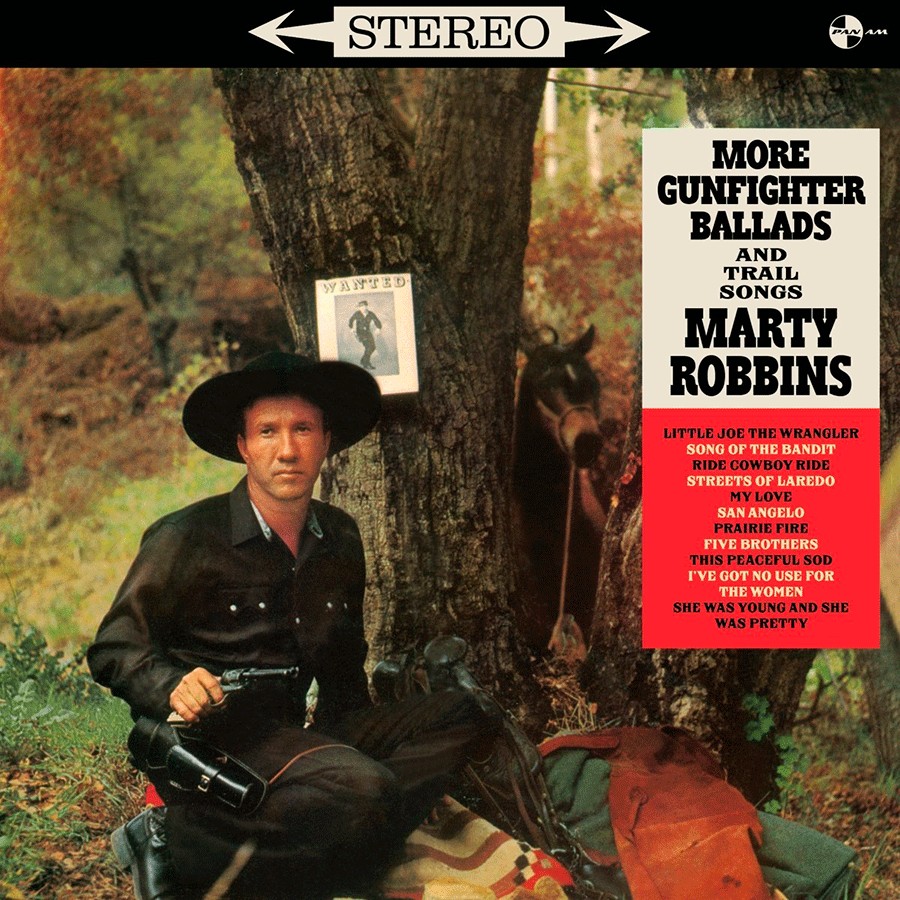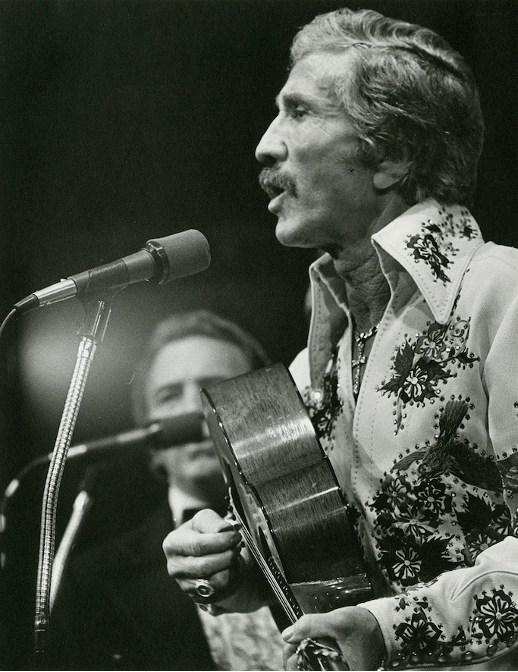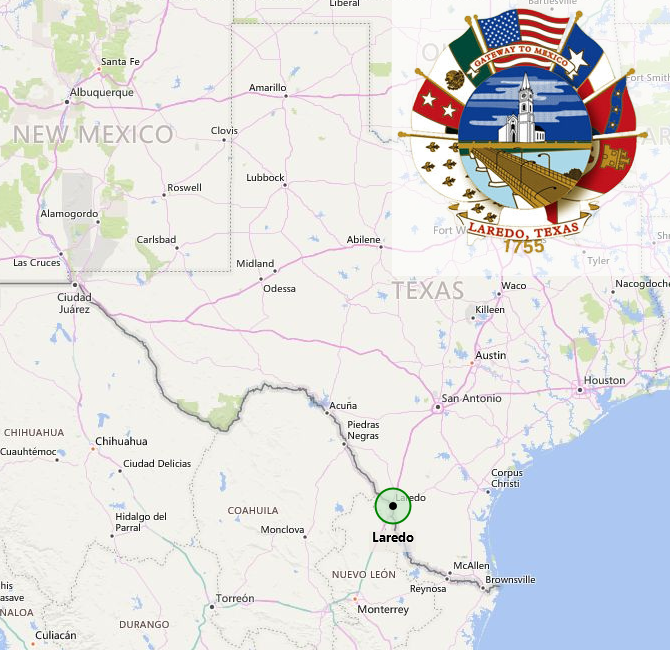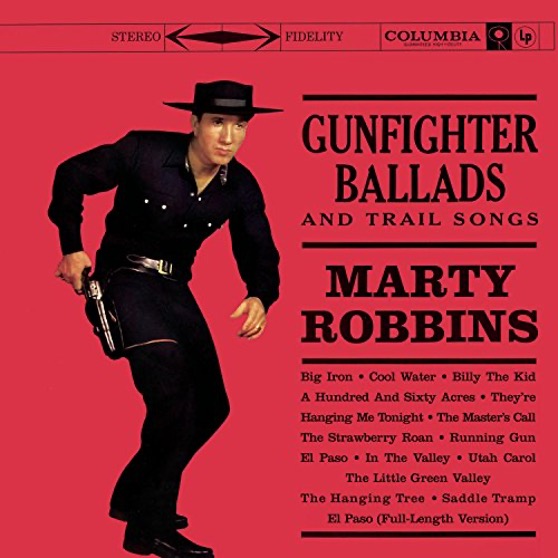Song: “Streets of Laredo” Artist: Marty Robbins Album/Year: More Gunfighter Ballads and Trail Songs (1960)

“Streets of Laredo“
The song “Streets of Laredo” is a popular song about cowboys and the Old American West. The first appearance of the song in the American music scene was when the song was published in John Lomax’s Cowboy Songs and Other Frontier Ballads in 1910, claiming origins as a traditional American cowboy ballad. In 1911, Frank H. Maynard claimed the song as his own and released it under the title “The Dying Cowboy.” Maynard was not from Texas, rather from Colorado Springs, CO. The original song “The Dying Cowboy” is essentially the same as “Streets of Laredo,” though Maynard claimed that Texas cowboys later appropriated his song for their own, retitling it and changing lyrics to reflect the town of Laredo, TX.
However, the song has earlier origins than Maynard’s 1911 song or the traditional cowboy ballad. The song is actually derived from the late 18th century traditional Irish folk song “The Unfortunate Rake,” which features similar lyrics telling of a man who laments his life to another while on his death bed.
As Irish immigrants arrived in America after escaping British rule during the 19th century, they settled in both the North and the South. Those that chose to settle in the South formed very tight-knit communities. Later, these Irish communities were integrated into Southern culture, even fighting for the Confederacy. Following their integration, Irish culture and songs permeated into Southern culture.
“Streets of Laredo” has been recorded by many artists over the years, ranging many genres and nationalities, including famous country stars Johnny Cash, Willie Nelson, Roy Rogers, etc.
Lyrics
[Verse 1] As I walked out in the streets of Laredo As I walked out in Laredo one day I spied a young cowboy, wrapped all in white linen Wrapped in white linen, as cold as the clay [Chorus] Oh, beat the drum slowly and play the fife lowly Sing the Death March as you carry me along Take me to the valley, there lay the sod o'er me I'm a young cowboy and know I've done wrong [Verse 2] I see by your outfit that you are a cowboy These words he did say as I boldly walked by Come sit down beside me and hear my sad story Got shot in the breast and I know I must die [Verse 3] Go fetch me some water, a cool cup of water To cool my parched lips then the poor cowboy said Before I returned, his spirit had left him Had gone to his maker, the cowboy was dead [Chorus] Oh, beat the drum slowly and play the fife lowly Sing the Death March as you carry me along Take me to the valley, there lay the sod o'er me I'm a young cowboy and know I've done wrong
Marty Robbins (1925-1982)

Born in Glendale, AZ, Marty Robbins (born Martin David Robinson) was an American country/folk singer who had a very successful and influential career as a singer/songwriter from the 1950’s through the 1970’s. Robbins began his career in 1947 with his own radio/TV show where he performed his music. After a big break thanks to a guest star on his show, Robbins was invited to play at the Grand Ole Opry in 1953.
The Grand Ole Opry is a live music performance show that began in 1925 as a radio show but has since grown into a largescale production that features the biggest stars of country and folk music.
Robbins had an extremely influential and successful career, with a total of 94 records on the country music top chart – 16 of which reached the #1 position. In 1959, Robbins released his most successful album, Gunfighter Ballads and Trail Songs, which sold over a million copies and featured the song “El Paso,” for which he won a Grammy.
The Texas Connection
Robbins was influenced heavily by stories of the Old West. His inspirations included his grandfather “Texas Bob” Heckle and Gene Autry, a famous country singer/actor from the 1930’s-50’s. Though not originally born in Texas, Robbins’ music gave a great deal of focus to the state, especially highlighted in “El Paso,” his song set in the border town of El Paso, TX.
Laredo, the town in which this song takes place, is a border town in southern Texas. Laredo is one of the oldest border crossing from Texas into Mexico. Due to its nature as a border crossing town, Laredo developed a unique blend of Mexican and American culture as the town grew in size.

The song “Streets of Laredo” tells the story of a dying cowboy who, in his last breaths, laments to another cowboy about the life he had led. Texas culture, and especially the culture of American country/folk music, is largely influenced by stories of cowboys settling and taming the Old “Wild” West. Whether it is the truth or a figment of Hollywood storytelling, the image of the American “cowboy” (maybe more a gunslinger than a rancher depending on the context) is engrained in the culture of Texas and is closely associated with the state and its people. Marty Robbins clearly embraced this image in his career, even dressing as a gunslinging cowboy for the cover of his album Gunfighter Ballads and Trail Songs (1959) as well as his album More Gunfighter Ballads and Trail Songs (1960), the album featuring “Streets of Laredo” .

Sources
“Marty Robbins – Streets of Laredo Lyrics”. Genius. https://genius.com/Marty-robbins-streets-of-laredo-lyrics “Marty Robbins”. Country Music Hall of Fame. https://www.countrymusichalloffame.org/hall-of-fame/marty-robbins “About”. Opry. https://www.opry.com/about "Laredo, Texas". Texas Center for Border Economic and Enterprise Development. Texas A&M International University. http://texascenter.tamiu.edu/dt-cp-laredo.shtml Gleeson, David. "The Irish in the South, 1815-1877". the University of North Carolina Press. https://uncpress.org/book/9780807849682/the-irish-in-the-south-1815-1877/
